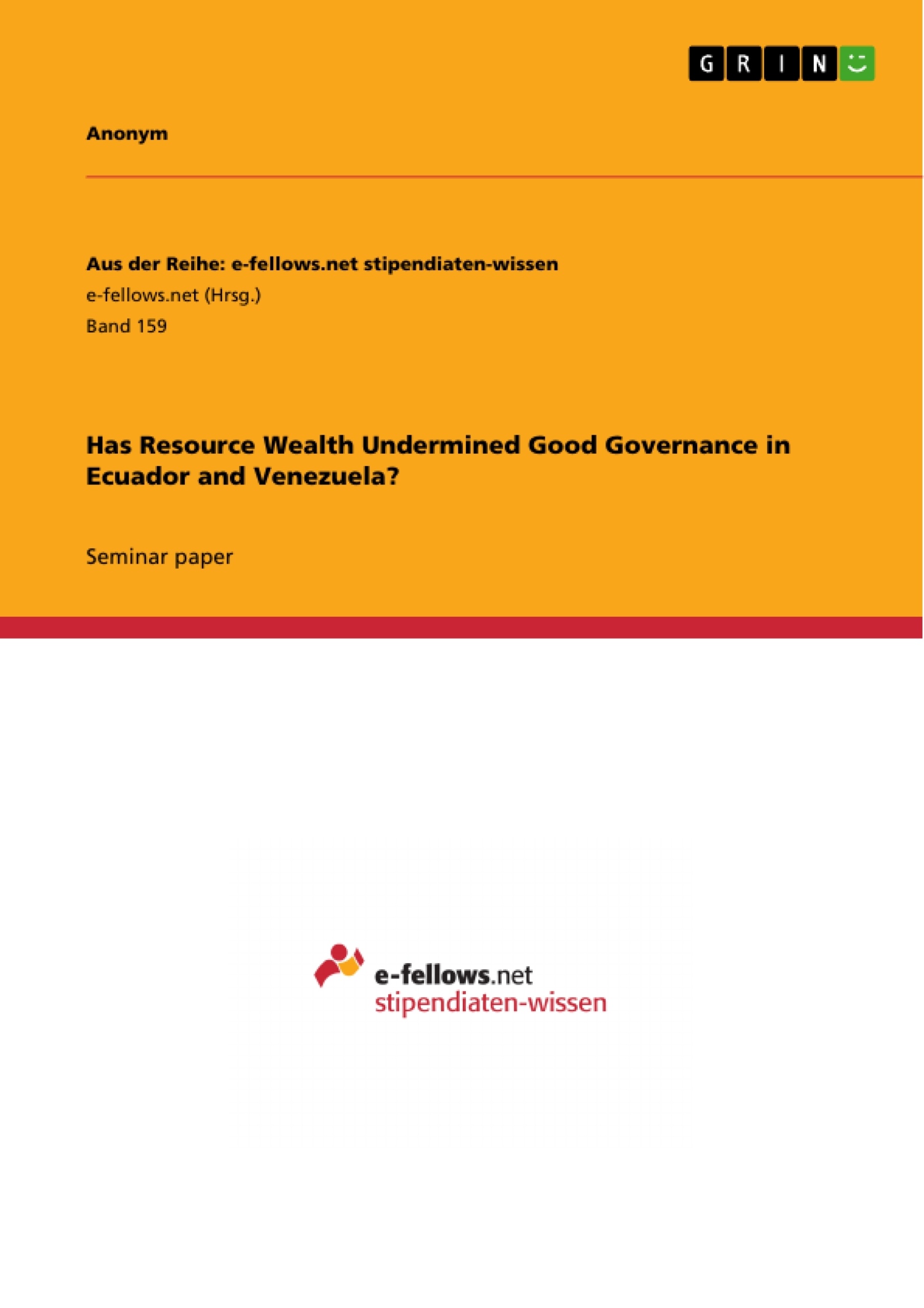When I visited Venezuela as second travel destination after Ecuador in Latin America last year, I remember very well passing by a huge mural painted on an oil refinery, showing: “Patria, Socialismo o Muerte”. I was struck by that image, as it visualized the impact of the ‘black gold’, and the attachment of national salvation and ideology to a single resource. Petroleum has changed the trajectory of all countries with the fortune (or the curse, depending on the point of view) of being located on top of its enormous basins more significantly than social scientists could have imagined. While geographically speaking the Middle East has received most academic attention, and also singular African countries have been examined thoroughly, this paper focuses on the case of Latin America, more specifically on its two OPEC members Ecuador and Venezuela. Furthermore, in the context of this course, I became inspired to explore the development and current status of the governmental authorities in both countries, based on the theoretical concept of good governance. Consequently, I will investigate in the link between national wealth in and subsequent exploitation of oil and gas, and its interaction with governance in the respective countries. I will introduce the so-called resource curse phenomenon in this context, as successful management of this somewhat messy socio-economic problem is doubtlessly an important indicator of good governance. Often overlooked in this discussion is the distinguishing feature that governance type plays in the resource curse, as most of the hydrocarbon-rich countries have no democratic political system (Ross 2001). While Ecuador and Venezuela as defective democracies do not directly fall into this category, I will argue that they nonetheless display all major features of the resource curse, so that development, defined in its broadest sense, suffers. The seemingly paradoxical outcome of resource-abundance and poor development needs further governance-focused investigation. I will hence introduce the concept of good governance, followed by an evaluation of Ecuador and Venezuela using objective measurement tools for good governance. In a final point I will address the question of causality and the related problems, due to the complex interaction of resource wealth and governance performance.
Inhaltsverzeichnis (Table of Contents)
- Introduction
- Economic Development and Resource Curse in Ecuador and Venezuela
- Conceptualizing Good Governance
- Evaluating Governance in Ecuador and Venezuela
- Resource Curse and Good Governance: Causes and Consequences
- Conclusion
Zielsetzung und Themenschwerpunkte (Objectives and Key Themes)
This paper examines the impact of resource wealth on governance in Ecuador and Venezuela, analyzing whether resource abundance has undermined good governance in these countries. The study focuses on the resource curse phenomenon, exploring how oil and gas wealth influences economic development, political stability, and the quality of governance in both nations. The author investigates the link between resource wealth and good governance using theoretical frameworks and objective measurement tools.
- The resource curse phenomenon and its impact on economic development and governance
- The relationship between resource wealth and political stability in Ecuador and Venezuela
- The role of good governance in mitigating the negative effects of the resource curse
- The importance of democratic governance in achieving sustainable development
- The challenges and complexities of managing resource wealth in resource-rich countries
Zusammenfassung der Kapitel (Chapter Summaries)
- Introduction: This chapter introduces the topic of resource wealth and its potential impact on governance, focusing specifically on the case of Ecuador and Venezuela. It establishes the relevance of the resource curse phenomenon and its implications for good governance.
- Economic Development and Resource Curse in Ecuador and Venezuela: This chapter provides a comparative analysis of Ecuador and Venezuela, highlighting their shared characteristics and distinct features related to resource wealth, economic performance, and governance. It examines the specific ways in which resource dependency has impacted their economies and political systems.
- Conceptualizing Good Governance: This chapter delves into the concept of good governance, outlining its key principles and the relationship between good governance and democratic structures. It discusses the importance of strong state institutions in promoting sustainable development and managing resource wealth effectively.
Schlüsselwörter (Keywords)
The key keywords and focus topics of this paper include: resource curse, good governance, democratic governance, economic development, political stability, Ecuador, Venezuela, oil and gas wealth, resource management, state institutions, rent-seeking, Dutch disease, corruption, and transparency.
Frequently Asked Questions
What is the "resource curse" phenomenon?
It refers to the paradox where countries with an abundance of natural resources (like oil) tend to have less economic growth and worse development outcomes than countries with fewer resources.
How has oil impacted governance in Ecuador and Venezuela?
The study argues that resource wealth has often undermined good governance, leading to corruption, rent-seeking, and political instability in both OPEC members.
What is "Good Governance" in this context?
Good governance involves transparent, accountable, and effective state institutions that promote sustainable development and manage national wealth responsibly.
What is "Dutch Disease"?
It is an economic phenomenon where a sudden increase in resource exports leads to a stronger currency, making other sectors like manufacturing less competitive.
Are Ecuador and Venezuela considered democracies?
The paper describes them as "defective democracies" that struggle with the major features of the resource curse despite their political systems.
- Citation du texte
- Anonym (Auteur), 2010, Has Resource Wealth Undermined Good Governance in Ecuador and Venezuela? , Munich, GRIN Verlag, https://www.grin.com/document/176309



